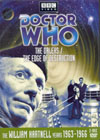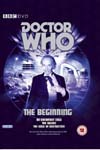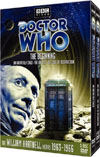DVD Extras include:
Episode One - The Dead Planet - directed by Christopher BarryThis is one of the best episodes of the seven-part Dalek story. As with "An Unearthly Child", this crucial 25-minute program was re-recorded a second time to work out all the technical hitches, a move which definitely paid off extremely well. Director Christopher Barry is in fine form, making all the scenes work. Writer Terry Nation is at his best getting the Doctor Who regulars to explore new worlds and new sci-fi ideas, which is what this episode is all about both inside and outside of the TARDIS. Other writers should have taken notes on how to use simple curiosity on behalf of the main characters in order to involve them in a story - it often attracts an audience's interest as well! Thankfully, the Doctor in particular has plenty to do, as he drives the plot with his lovable mischief. Tristram Cary's music makes a wonderful debut, as most of the pieces that will be re-used throughout the series get introduced in well-deserving scenes. The cliff-hanger is a true classic, and one of the most famous at that. A great episode.
Episode Two - The Survivors - directed by Christopher BarryAfter episode one's polished lead-up, and in retrospect considering the Daleks' importance in Doctor Who as a whole, one approaches this half-hour episode with high expectations of the classic first encounter between the time traveller's group and his most deadly adversaries. It isn't all that exciting, or particularly well directed - the weakest in Chris Barry's contributions to this story. Our main characters spend most of their time being inactive in captivity, while the Doctor Who production team has yet to find the best way to perform and shoot their new Dalek creations.On the plus side, David Graham and Peter Hawkins get their deep-grating Dalek voices spot on right from the start, which is more than can be said for their later work on "The Dalek Invasion of Earth" (story no. 10), "The Chase" (story no. 16), and "Mission to the Unknown" (story no. 19), where the highest ranking Dalek always seems to end up with the lamest, squeakiest voice. Perhaps having a good director to coach them makes all the difference. The mysterious thundering jungle is very well done. Despite this, the cliff-hanger doesn't really work - there is less anticipation of danger or a new discovery as there is of watching more of the same next week.
Episode Three - The Escape - directed by Richard MartinThis episode improves over the previous one, and is I think, Richard Martin's best-directed half-hour episode ever. Our main characters also have more interesting things to do and scenes to perform. Thankfully, Richard Martin does get it mostly right this time, making episode three one of the more enjoyable ones of the story. The cliffhanger is a vast improvement on the previous episode as well.
Episode Four - The Ambush - directed by Christopher BarryChristopher Barry comes back to the director's chair to do what I consider to be the best episode in the entire Dalek story. Three fascinating story beats keep interest running high, firstly throughout the action at the lift. The camera angle on the circular model lift is confusing; particularly the darker "underside" shots are upside down from what would be a more natural view.
During the third story beat, the Doctor takes a keen interest in the history of Skaro and its various cultures and peoples. More great Terry Nation style exploration beautifully written, acted, and directed. The cliff-hanger is great, underscored by the horror on the travellers' faces and in Tristram Cary's music. The Doctor has lots to do in this one, but Ian is already emerging as the main character and beginning to steal the show by undertaking all of the crucial, heroic actions.
Episode Five - The Expedition - directed by Christopher BarryThe moral argument that ensues between the four main characters is a major attraction that sets this story apart from many of the formulaic Dalek sequels that appeared on Doctor Who in later years - it is well thought out and written by Terry Nation, and also well acted, directed, and shot by the cast and crew. Again, this is more than bug-eyed monster terror for tots. Ian really comes to the fore as the man of both action and moral conscience, outshining the Doctor and firmly taking over the heroic `main character' role for the rest of the story. Although William Hartnell's Doctor still has much to do in this half-hour episode, it is interesting to note how many of Ian's lines were later given to Peter Cushing's Doctor in the movie version of the story, rightly re-positioning the Doctor much closer to the heroic main character center.The Daleks have many scenes all on their own, something which doesn't always work in practice, but it gets pulled off well here, thanks to some expert direction. The swamp has a great atmosphere thanks to a great montage of sound effects, and more suspenseful direction, and minimal special effects `monster' shots. We get a nice creepy cliffhanger, too.
Episode Six - The Ordeal - directed by Richard MartinThis episode is aptly named, because it is something of an ordeal to watch. If any of the episodes were created as last-minute story padding, this is the one! Most of our attention remains on Ian's party throughout, although their slow meanderings are not very exciting. They could have been made darkly atmospheric, but this doesn't happen; the direction is rather bland, and there is little recognizable music in the episode until the very end, and even that doesn't really work.Richard Martin is sometimes listed as a director who was confident and exuberant in tackling the technical problems associated with studio sci-fi adventures, special effects, and the Daleks in particular. True, but in these early days here he doesn't seem to display much affinity for being successfully ARTISTIC about it - camera angles often miss the mark of drawing the audience's attention to the next most natural item of interest that would move the story forward, actors appear uninspired, and scenes lack the emotion intended for them in the writing. The Doctor makes his final heroic contribution, precisely one episode too early, and it isn't very well or believably directed either, but at least he has something crucial to do in the final struggle with the Daleks. Antodus gives the only really interesting performance in the episode. It's often hard to stay awake while the other members of the group go about their practically transitional business. The cliffhanger is riveting and dramatic, but Ian isn't all that believable at this point.
Episode Seven - The Rescue - directed by Richard MartinDespite some more dodgy hit-and-miss direction from Richard Martin, the story's concluding episode is much more interesting and enjoyable than the better-directed episode three, and of course miles ahead of episode six. This may be one of the all-time classic William Hartnell stories, but don't look for a classic William Hartnell performance as the Doctor in its two concluding episodes - it just wasn't in the script. Ian is every bit the leading main character hero in this one.It's strange that the Daleks' ability to paralyse humanoids with their weapons was only seen once more in "Planet of the Daleks" (story no. 68) - it opens up so much more in the way of story possibilities and Dalek deviousness if they have something in between vocal threats and all out killing. The directing is `on' here during the transition from cave to city, with very good lighting effects, and a proper and interesting looking cut-away shot. The action-scenes are another matter. Post-climax, the drama is satisfying once more, as the Doctor collects himself and William Hartnell is back on form again. The good-byes are well-done, a bit cold and stiff but then that is appropriate in this case. The dematerialization is satisfying, and a good shot of the travellers munching away in the console room while the Doctor adjusts controls all around the console gives us a good appetite for the next story without leaving any unresolved cliffhangers. A good closing for a classic, and hats off to director Richard Martin for pulling it off.
This story has become available on DVD as the second adventure in "The Beginning" DVD box set. Although the popular original edition from 2006 has now become a rare item, a newer 2013 re-issue offers identical content at a more competitive price... Click on the amazon symbol for your area to open amazon's page in a new window and see additional product information before purchasing.
Comments on this article are welcome. You may contact the author from this page:
|
|||||||||||||||||||||||||||||||||||||||||||



 2013
2013 2013
2013




